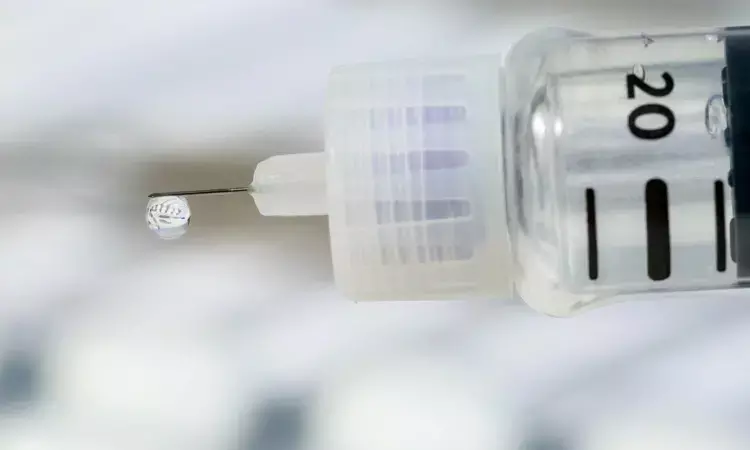- Home
- Medical news & Guidelines
- Anesthesiology
- Cardiology and CTVS
- Critical Care
- Dentistry
- Dermatology
- Diabetes and Endocrinology
- ENT
- Gastroenterology
- Medicine
- Nephrology
- Neurology
- Obstretics-Gynaecology
- Oncology
- Ophthalmology
- Orthopaedics
- Pediatrics-Neonatology
- Psychiatry
- Pulmonology
- Radiology
- Surgery
- Urology
- Laboratory Medicine
- Diet
- Nursing
- Paramedical
- Physiotherapy
- Health news
- Fact Check
- Bone Health Fact Check
- Brain Health Fact Check
- Cancer Related Fact Check
- Child Care Fact Check
- Dental and oral health fact check
- Diabetes and metabolic health fact check
- Diet and Nutrition Fact Check
- Eye and ENT Care Fact Check
- Fitness fact check
- Gut health fact check
- Heart health fact check
- Kidney health fact check
- Medical education fact check
- Men's health fact check
- Respiratory fact check
- Skin and hair care fact check
- Vaccine and Immunization fact check
- Women's health fact check
- AYUSH
- State News
- Andaman and Nicobar Islands
- Andhra Pradesh
- Arunachal Pradesh
- Assam
- Bihar
- Chandigarh
- Chattisgarh
- Dadra and Nagar Haveli
- Daman and Diu
- Delhi
- Goa
- Gujarat
- Haryana
- Himachal Pradesh
- Jammu & Kashmir
- Jharkhand
- Karnataka
- Kerala
- Ladakh
- Lakshadweep
- Madhya Pradesh
- Maharashtra
- Manipur
- Meghalaya
- Mizoram
- Nagaland
- Odisha
- Puducherry
- Punjab
- Rajasthan
- Sikkim
- Tamil Nadu
- Telangana
- Tripura
- Uttar Pradesh
- Uttrakhand
- West Bengal
- Medical Education
- Industry
Ready-to-Use Glucagon effectively maintains blood sugar during exercise in type 1 diabetes

Delhi: A novel ready-to-use liquid stable glucagon was effective in maintaining euglycemia (normal levels of blood sugar) during prolonged, continuous, intense aerobic exercise in patients with type 1 diabetes, according to a recent study published in the journal Diabetes.
Ronnie Aronson from Canada and colleagues evaluated the safety and efficacy of a novel ready-to-use liquid stable glucagon (RTUG; Xeris Pharmaceuticals) for the prevention of exercise-induced hypoglycemia (EIH) during and after moderate-to-high intensity aerobic exercise.
For the purpose, the researchers conducted a phase 2 randomized, placebo-controlled, double-blind, clinical research center (CRC) crossover stage, followed by a 12-week 3-arm parallel Outpatient stage. It enrolled 48 adults with type 1 diabetes who were using an insulin pump. In the outpatient stage, subjects were assigned to RTUG 150 μg plus 50% basal insulin pump reduction, or RTUG 150 μg with no insulin change, or to placebo. Blood sugar was measured by blood sugar meter before, during, and after moderate-to-high intensity, aerobic exercise to evaluate the incidence and severity of hypoglycemia. Continuous glucose monitors were utilized in the CRC and Outpatient stage.
Key findings of the study include:
- Of the 48 subjects, 45 subjects (93.8%) completed multiple exercise sessions and have entered the ongoing outpatient stage.
- On average, subjects were 37 (±11.2) years old with an average BMI of 26.7 (±4.6), 52.1% male and 81.3% white.
- In the CRC stage, the placebo group experienced more EIH (16.7% vs. 2.1%), had 7-times higher glucose tablet utilization during and after exercise, resulting in more post-exercise hyperglycemia (blood sugar >250 mg/dL).
- To date, no SAEs have occurred, and RTUG 150 μg caused no edema, erythema, nor injection site reactions.
"RTUG 150 μg maintained euglycemia during prolonged, continuous, intense aerobic exercise. In the CRC stage, RTUG was more effective than insulin reduction alone, to prevent EIH, and may result in less post-exercise hyperglycemia than the ingestion of carbohydrates. Data from the ongoing Outpatient stage may support the use of RTUG to prevent EIH during and after aerobic exercise in real-world settings," concluded the authors.
The study, "Ready-to-Use Glucagon for the Prevention of Exercise-Induced Hypoglycemia during Aerobic Exercise," is published in the ADA journal Diabetes.
DOI: https://doi.org/10.2337/db20-15-LB
Dr Kamal Kant Kohli-MBBS, DTCD- a chest specialist with more than 30 years of practice and a flair for writing clinical articles, Dr Kamal Kant Kohli joined Medical Dialogues as a Chief Editor of Medical News. Besides writing articles, as an editor, he proofreads and verifies all the medical content published on Medical Dialogues including those coming from journals, studies,medical conferences,guidelines etc. Email: drkohli@medicaldialogues.in. Contact no. 011-43720751


